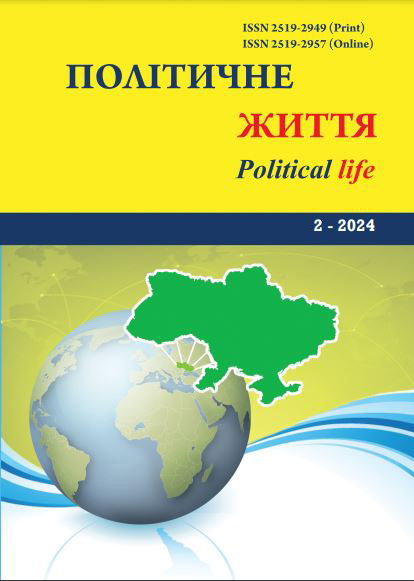Symbolic means of forming identity policy
DOI:
https://doi.org/10.31558/2519-2949.2024.2.20Keywords:
identity, identity politics, symbol, symbolic means, symbolic interactionism, mobilization of identities, political mythology, political ritual, political holidays, politics of memory, collective consciousnessAbstract
The article analyzes identity politics as a symbolic practice that determines the social and political reality and peculiarities of human existence, taking into account the systems of collective and individual ideas and symbols as essential elements of the formation of political existence. The essence of the mechanisms and symbolic means of identity politics is substantiated. Emphasis is placed on the understanding of the political world as a kind of space formed on the basis of social ideas and symbolic meanings. The questions of the formation of social ideas, the essence of symbolism and the possibilities of a rational understanding of the political as symbolic are investigated.
The key elements of the interaction between political myths, rituals and identity politics are identified, and attention is drawn to the significance of political holidays as symbolic forms for the creation of political reality and identity formation. It is noted that each country implements the politics of identity, relying on the politics of memory, which acts as the spiritual basis for each nation, preventing the stratification of cultural experience into isolated chronological strata, with the aim of creating a single community in the sense of a political nation. It is noted that stable constructions of symbols contribute to the unity and physicality of the political culture of society.
A general conclusion is made that the use of symbolism to understand the concept of the political helps to determine an important aspect of creating an ontology of the political world, establishing an understanding of the broader context of identity politics and its symbolic dimension in modern society. It is noted that in the conditions of the Russian-Ukrainian war, symbolic elements serve as a powerful means of expressing the interests and positions of the Ukrainian state.
References
Нагорна Л. Поняття «національна ідентичність» і «національна ідея» в українському термінологічному просторі. Політичний менеджмент. 2003. №2. С. 14–30.
Що пережили Україна та світ у 2020 році й чого нам чекати від 2021-го: політичні й економічні прогнози. Фонд Демократичні ініціативи ім. І. Кучеріва, 21 грудня 2020 р. URL: https://dif.org.ua/article/shcho-perezhili-ukraina-ta-svit-u-2020-rotsi-ychogo-nam-chekati-2021-go-politichni-y-ekonomichni-prognozi#_Toc59385790 (дата звернення: 10.02.2024).
Нагорна Л. П. Регіональна ідентичність: український контекст: монографія. Київ : ІПіЕНД імені І. Ф. Кураса НАН України, 2008. 405 с.
Степико М. Т. Українська ідентичність: феномен і засади формування: монографія. Київ : НІСД, 2011. 336 с.
Політико-правові механізми формування національної ідентичності населення Донбасу: Наукова записка / Кресіна І.О. (керівник авт. кол.), Шемшученко Ю. С., Горбатенко В. П., Лойко Л. І., Кресін О. В., Стойко О. М. Київ : Інститут держави і права ім. В. М. Корецького НАН України, 2015. 116 с.
Hobsbawm E. Inventing Traditions. The Invention of Tradition. Cambridge, 2002. 320 p.
Горбатенко В. Футурологія і політика : монографія. Київ : Академвидав, 2019. 288 с.
Бабкіна О. В. Політична соціалізація як засіб формування політичної культури студентства. Науковий часопис НПУ імені М. П. Драгоманова. 2009. №1. С. 4–10.
Castells M. The power of identity. Cambridge ; Mass., 1997. 352 р.
Корнієнко В. О., Денисюк С. Г. Формування європейської ідентичності: аргументи для України. Політологічний вісник. Вип. 80. Київський національний ун-т імені Тараса Шевченка, 2018. С. 20–35.
Geertz C. Centers, Kings and Charisma: Reflections on the Symbolics of Power. Geertz C. Local Knowledge: Further Essays in Interpretive Anthropology. New York : Basic Books Inc., 1983. 256 p.
Bell C. Ritual: perspective and dimensions. New York : Oxford University Press, 1997. 368 p.

